sx blog
Our digital space for brief commentary and reflection on cultural, political, and intellectual events. We feature supplementary materials that enhance the content of our multiple platforms.
Liberation Film Series: Walter Rodney
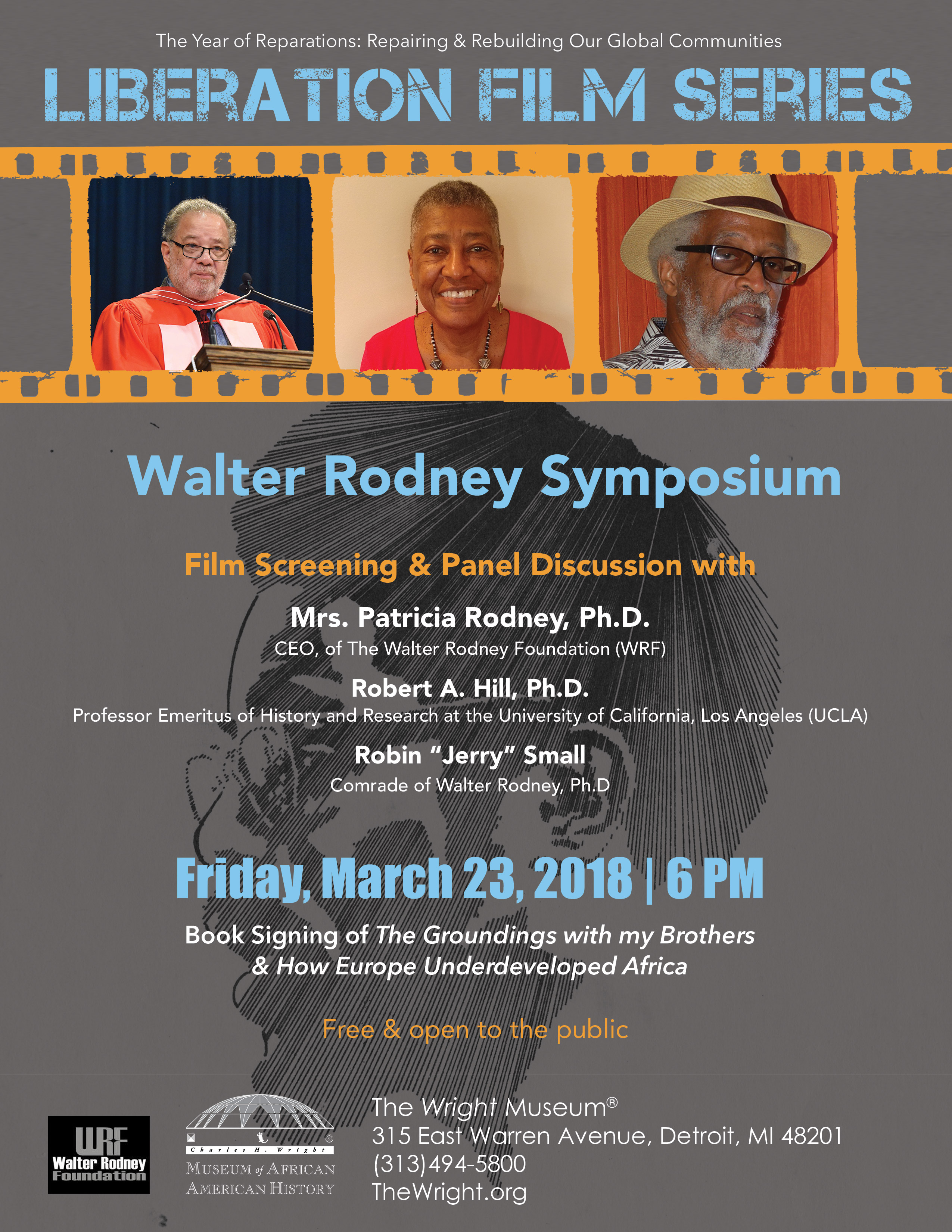
23 March 2018. Film screening and panel discussion with Patricia Rodney, Robert A. Hill, and Robin "Jerry" Small on the legacy of Walter Rodney. Symposium will be held at the Wright Museum in Detroit, MI.
More information may be found here: https://thewright.org/index.php/explore/events/upcoming-events.
After the Hurricane: A Puerto-Rico Syllabus Teach-In
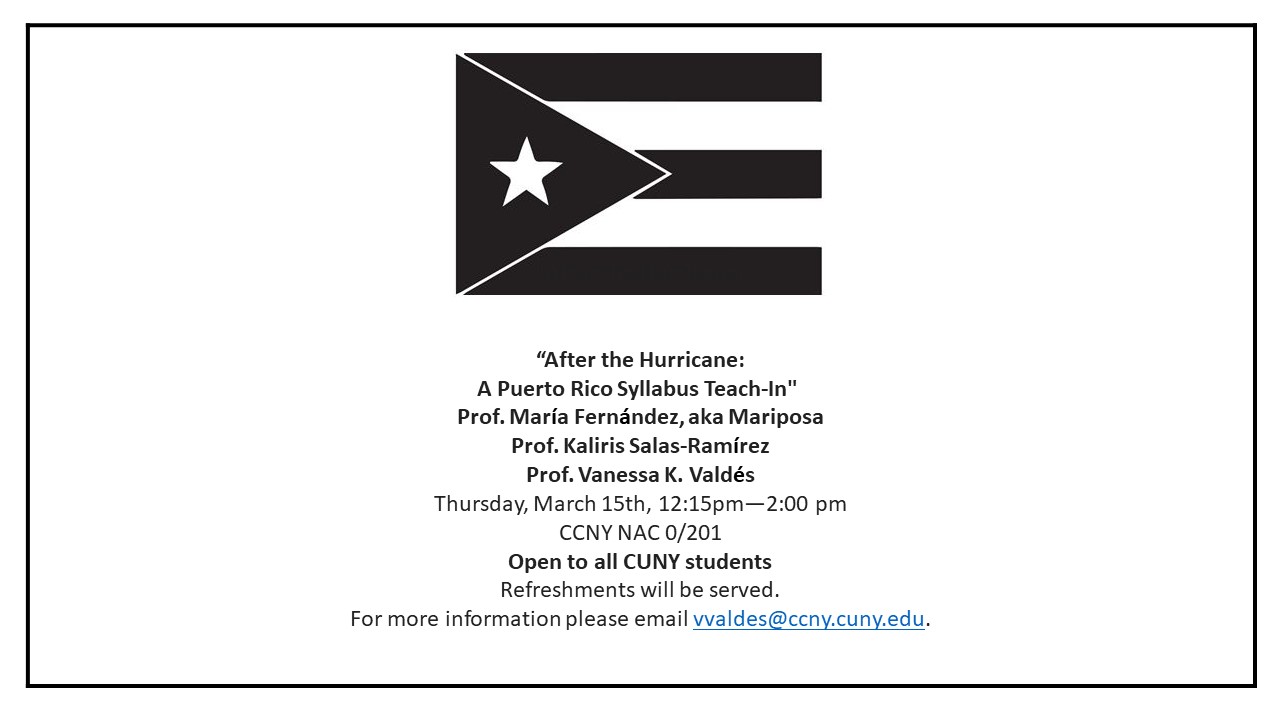
14 March 2018. Profs. María Fernández aka Mariposa (Black Studies Program), Kaliris Salas-Ramírez (CUNY School of Medicine), and Vanessa K. Valdés (Dept. of Classical and Modern Languages and Literatures) spoke on the current state of Puerto Rico after the hurricane. Issues included a historical background to this present moment (how did we get here?), disaster relief efforts, the privatization of schools, and what we can do moving forward. This conversation was inspired by the Puerto Rico Syllabus (puertoricosyllabus.com).
Rosamond S. King named finalist for Lambda Literary Award
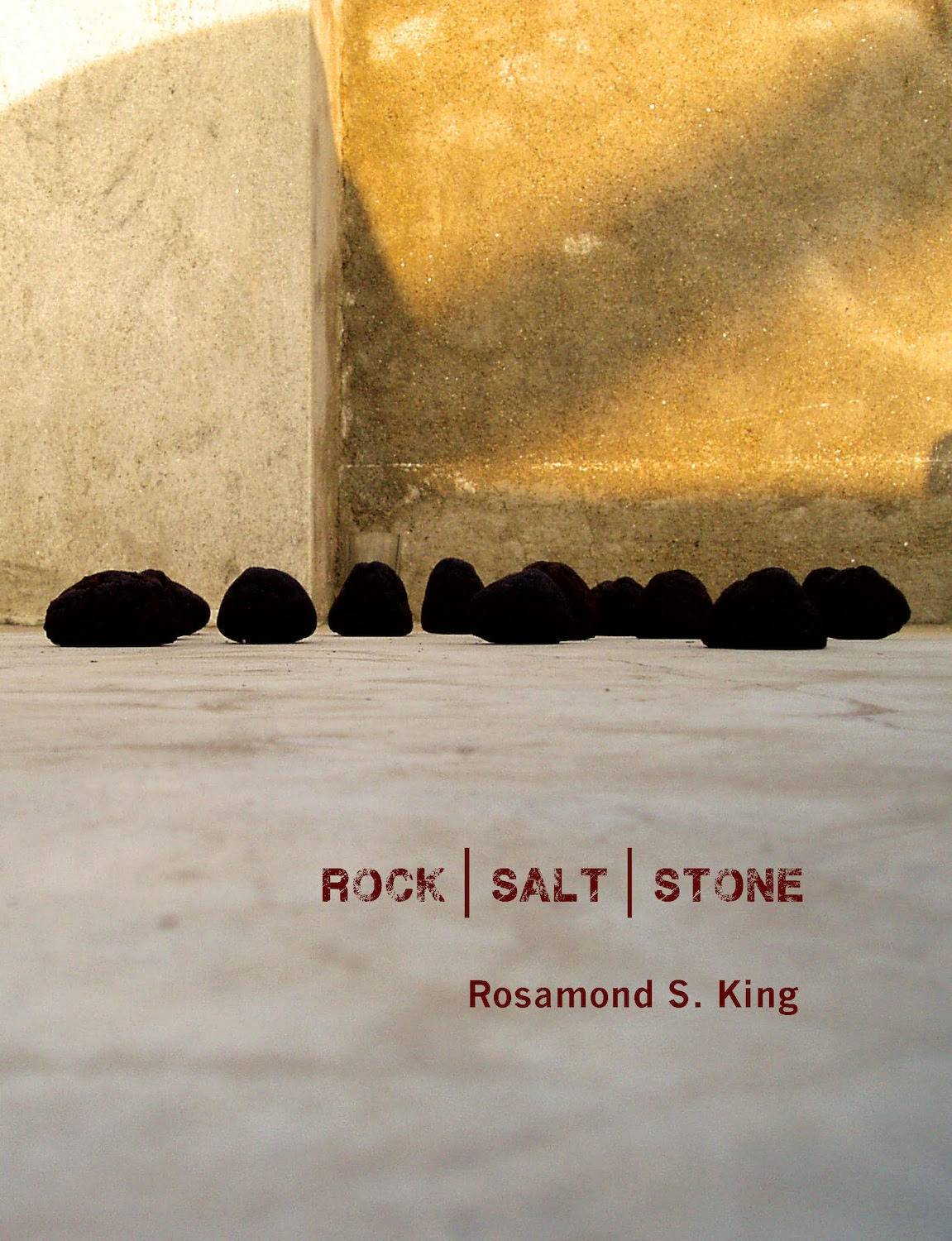
King's Rock | Salt | Stone is a finalist for a Lambda Literary award. "The Lambda Literary Awards identify and celebrate the best lesbian, gay, bisexual and transgender books of the year and affirm that LGBTQ stories are part of the literature of the world. The ‘Lammys,’ which receive national and international media attention, bring together 600 attendees—including nominees, celebrities, sponsors, and publishing executives—to celebrate excellence in LGBTQ publishing. It is the most prestigious and glamorous LGBTQ literary event in the world.”
This gala awards ceremony will take place at NYU on 4 June 2018.
A full list of the Lambda finalists can be found here:
https://www.lambdaliterary.org/features/news/03/06/lambda-literary-award-finalists/
Roshini Kempadoo exhibiting at Houston Fotofest this March

10 March-22 April. Roshini Kempadoo will be exhibiting as an invited artist to the India: Contemporary Photographic and New Media Art exhibition lead curated by Sunil Gupta. FotoFest 2018 speaks to a number of contemporary issues in India including gender and sexuality, land rights conflict, the environment, human settlement and migration, and caste and class divisions. The participating artists are from India and the global Indian diaspora.
Details for the event may be found @ e-flux.com
"Bad Advice from Bad Women": Tiana Reid at Strand Books

March 8th @ 7pm @ Strand Books, NYC.
Join some of NYC’s best bad women as they share their incendiary work and instigate further upending of good girl mores.
Critical Caribbean Feminisms: A Dialogue with Erna Brodber and Nicole Dennis-Benn
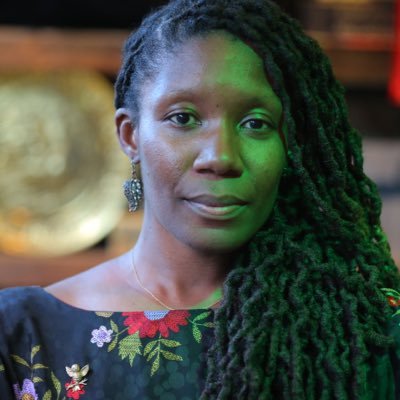
Mar 22, 2018 | 6:00pm
James Room, 3009 Broadway, New York, NY 10027
Co-Sponsors: Barnard Center for Research on Women, Small Axe: A Caribbean Journal of Criticism
Please join us as we host a conversation between authors Erna Brodber (Nothing’s Mat; The Rainmaker’s Mistake, among others) and Nicole Dennis-Benn (Here Comes the Sun) as the first event in the newly-expanded series, Critical Caribbean Feminisms. These authors will discuss issues including the Caribbean and its diaspora, method, feminism, and gender in their work. The conversation with be followed by a moderated discussion.
RSVP here: http://bcrw.barnard.edu/event/critical-caribbean-feminisms-a-dialogue/
sx archipelagos now accepting submissions for "Slavery in the Machine"
sx archipelagos now accepting submissions for "Slavery in the Machine"

sx archipelagos is now accepting submissions for our upcoming special section "Slavery in the Machine," guest edited by Jessica Marie Johnson. This special section aims to highlight scholarship situated at the intersection of technology and hemispheric American slavery. Topics may include but are not limited to:
- black code studies through a hemispheric lens
- plantation societies and the socio-technics of enslavement
- digital archives of slavery
- representations of slavery on the open web or social media
- cultural analytics and slavery
Deadline for abstracts 16 April
Article submission deadline 16 July
sx archipelagos is a born-digital articulation of the Small Axe Project. It is a peer-reviewed publication platform devoted to creative exploration, debate, and critical thinking about and through digital practices in contemporary scholarly and artistic work in and on the Caribbean. Given the wide implications of the “digital turn” for our very conceptions of knowledge, our mission is to discern the ways in which the digital may enhance and transform our comprehension of the regional and diasporic Caribbean. sx archipelagos responds to this challenge with three distinct dimensions of critical production: scholarly essays; digital scholarship projects; and digital project reviews
Filmmaker Frances Negrón-Muntaner in conversation with Vanessa Pérez-Rosario
Filmmaker Frances Negrón-Muntaner in conversation with Vanessa Pérez-Rosario
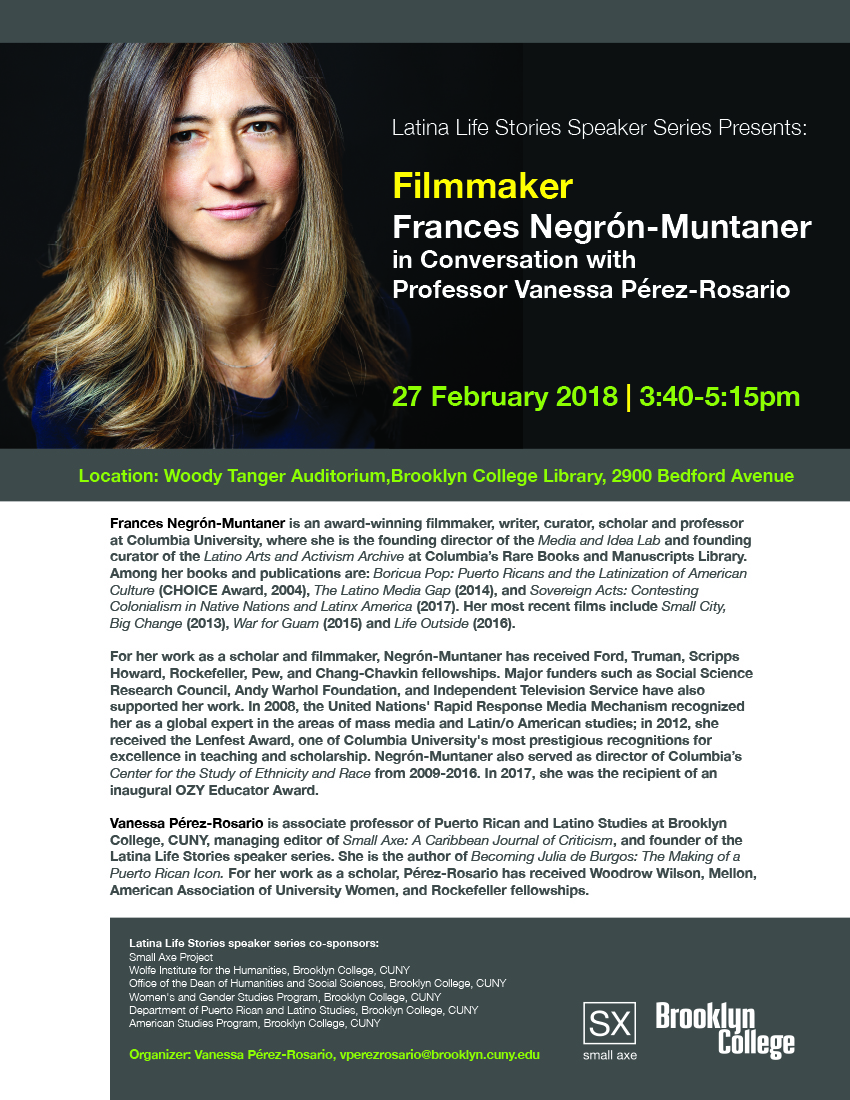
Latina Life Stories Speaker Series Presents:
Date: 27 February 2018
Time: 3:40-5:15pm
Location: Woody Tanger Auditorium, Brooklyn College Library
Frances Negrón-Muntaner is an award-winning filmmaker, writer, curator, scholar and professor at Columbia University, where she is the founding director of the Media and Idea Lab and founding curator of the Latino Arts and Activism Archive at Columbia’s Rare Books and Manuscripts Library. Among her books and publications are: Boricua Pop: Puerto Ricans and the Latinization of American Culture (CHOICE Award, 2004), The Latino Media Gap (2014), and Sovereign Acts: Contesting Colonialism in Native Nations and Latinx America (forthcoming). Her most recent films include Small City, Big Change (2013), War for Guam (2015) and Life Outside (2016).
For her work as a scholar and filmmaker, Negrón-Muntaner has received Ford, Truman, Scripps Howard, Rockefeller, Pew, and Chang-Chavkin fellowships. Major funders such as Social Science Research Council, Andy Warhol Foundation, and Independent Television Service have also supported her work. In 2008, the United Nations' Rapid Response Media Mechanism recognized her as a global expert in the areas of mass media and Latin/o American studies; in 2012, she received the Lenfest Award, one of Columbia University's most prestigious recognitions for excellence in teaching and scholarship. Negrón-Muntaner also served as director of Columbia’s Center for the Study of Ethnicity and Race from 2009-2016. In 2017, she was the recipient of an inaugural OZY Educator Award.
Vanessa Pérez-Rosario is associate professor of Puerto Rican and Latino Studies at Brooklyn College, CUNY, managing editor of Small Axe: A Caribbean Journal of Criticism, and founder of the Latina Life Stories speaker series. She is the author of Becoming Julia de Burgos: The Making of a Puerto Rican Icon. For her work as a scholar, Pérez-Rosario has received Woodrow Wilson, Mellon, American Association of University Women, and Rockefeller fellowships.
Latina Life Stories speaker series co-sponsors:
Small Axe Project
Wolfe Institute for the Humanities, Brooklyn College, CUNY
Office of the Dean of Humanities and Social Sciences, Brooklyn College, CUNY
Women's and Gender Studies Program, Brooklyn College, CUNY
Department of Puerto Rican and Latino Studies, Brooklyn College, CUNY
American Studies Program, Brooklyn College, CUNY
Organizer: Vanessa Pérez-Rosario, vperezrosario@brooklyn.cuny.edu
New exhibit at Colorado College curated by Anthony Bogues
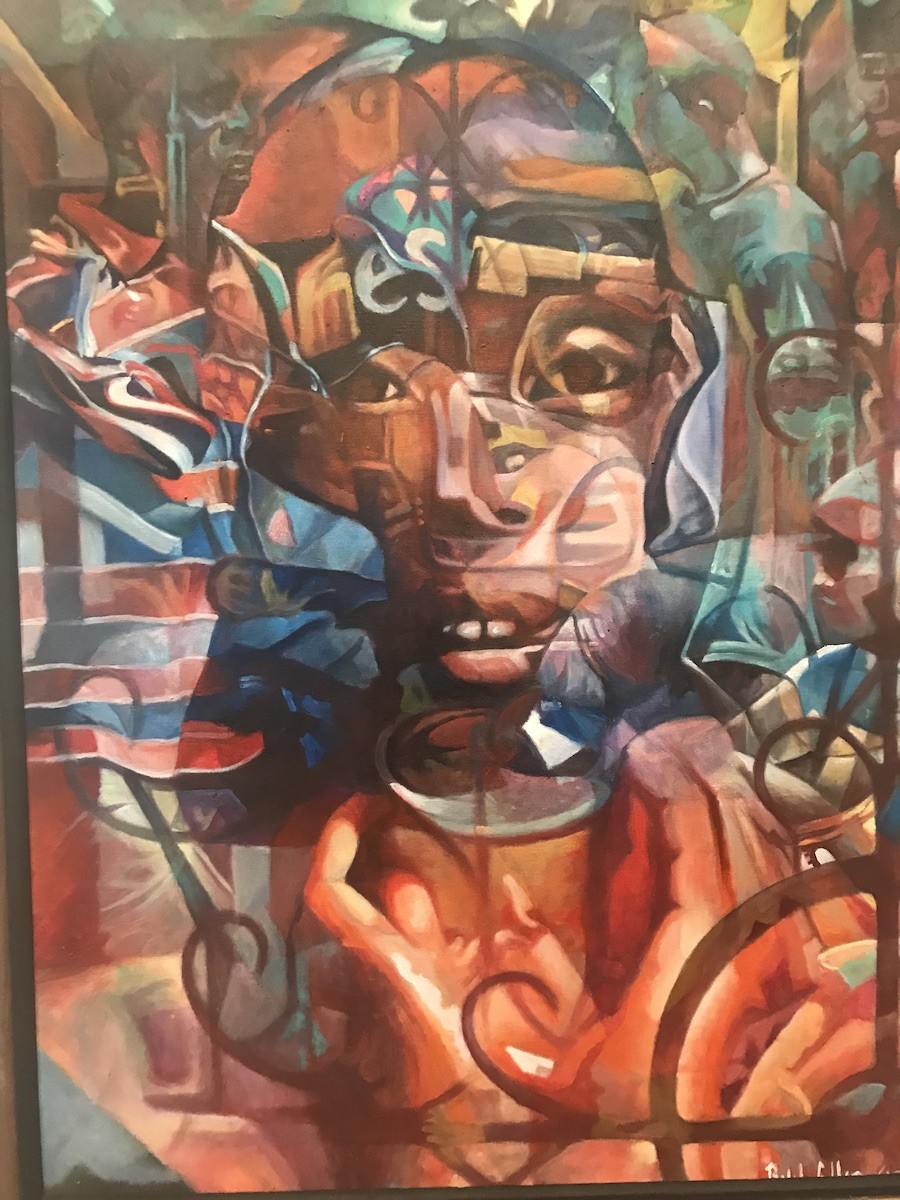
Saturday, 10 February. The Colorado Springs Fine Arts Center at Colorado College will officially open The Art of Haiti: Loas, History and Memory, a title which curator Anthony Bogues calls “deliberate and precise,” features contemporary Haitian artwork, commenting on the cultural memory of Haiti, the Loas (spirits) that embody the Vodou religion, and the history that informs the art and culture of Haiti today.
Learn more about the exhibition here.
Projecting the New Thing: Black Experimental Film in the Wake of the Black Arts

02 February. Curated by Brent H. Edwards, Projecting the New Thing: Black Experimental Film in the Wake of the Black Arts explores the aesthetic experiments of black filmmakers in the 1960s and 70s, when a number of African American artists began to explore 16mm film as a medium for black aesthetics. Working independently, taking advantage of sporadic and fleeting government funding or institutional support when they could, a number of black writers and musicians turned to film with an eye to the possibilities of crafting a visionary cinema. Their projects emerged in a variety of circumstances: More than simply a documentary, Amiri Baraka’s 1968 The New-Ark offers a bold and formally innovative portrait of the cultural nationalism of the Spirit House Movers and the Committee for a Unified Newark. Saxophonist Alan “Juice” Glover’s 1969 Birth — supported in part by a Columbia outreach effort after the controversy over the university’s plans to build a gymnasium in Morningside Park — depicts the coming to consciousness of a young black man in surrealistic tones inspired by Buñuel’s Un Chien Andalou. A fragmented diasporic dream suite set against the stark realities of St. Louis, the 1972 Sweet Willie Rollbar’s Orientation (with an evocative soundtrack by Julius Hemphill) is one of the legendary productions of the Black Artists’ Group. Taken together, these seldom-seen short films amount to a remarkable record of trans-medium experimentation in the years before the emergence of independent black feature film directors such as Bill Gunn, Kathleen Collins, Larry Clark, Charles Burnett, and Julie Dash.